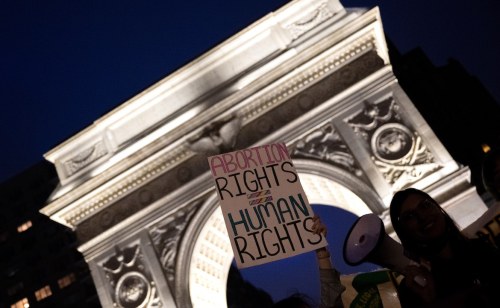You’re not alone if you’re trying to make sense of the Supreme Court’s decision to overturn Roe v. Wade, rolling back abortion protections that have been in place for nearly 50 years. The decision will have have a ripple effect on birthing people and the fate of abortion access overall throughout the United States.
In 1973, the Roe v. Wade ruling codified the right for people to receive abortions under the 14th Amendment, which made pregnancy termination legal until 23 weeks (when a fetus can potentially live outside of a womb). Friday’s decision in Dobbs v. Jacskon Women’s Health Organization leaves it to individual states to determine abortion access. Over 135 million people are likely to face restrictions or lose the legal right to abortions overnight, according to NPR.
With the overturning of Roe v. Wade, 26 states have laws on the books that either ban or restrict abortion access, according to the Guttmacher Institute. Thirteen of those states have trigger laws, which means bans go into effect immediately. Data from the Center for Reproductive Rights indicates that there are U.S. states and territories are “hostile” environments for abortion access, which means these states are vulnerable to the resurgence of old abortion bans or the implementation of new ones. These states and territories include: Alabama, American Samoa, Arizona, Arkansas, Georgia, Guam, Idaho, Indiana, Kentucky, Louisiana, Michigan, Mississippi, Missouri, Nebraska, North Carolina, North Dakota, the Northern Mariana Islands, Ohio, Oklahoma, Pennsylvania, South Carolina, South Dakota, Tennessee, Texas, Utah, West Virginia, Wisconsin, and Wyoming.
Overturning Roe v. Wade potentially criminalizes abortions for folks who want to terminate a pregnancy and could criminalize miscarriages since healthcare professionals would be able to call the authorities if they suspect interference with the pregnancy. This happened last year in Oklahoma. In 2021, 19-year-old Brittney Poolaw was charged with first-degree manslaughter after miscarrying and admitting to using meth before seeking care. The methamphetamines were not determined to be the cause of the pregnancy loss, but the admission was enough for her to be sentenced to four years in prison.
Additionally, many states arguably are unequipped to handle the consequences of carrying babies to term. Texas, for instance, has fewer insured people than most states, and the most uninsured children of any state. Additionally, Texas and Mississippi are considered maternal health deserts, which means pregnant people may not have access to the necessary care to bring a fetus to full term. Mississippi has the highest rate of child poverty.
“To anyone today who is scared or angry or determined, know this—17 million Planned Parenthood supporters proudly stand with you,” Alexis McGill Johnson, president and CEO of Planned Parenthood, tweeted in response to the decision. “We will rebuild the freedom that is ours. We’re in it for the long haul.” The fight to ensure safe access isn’t over, and there are actions you can take to make sure your voice is heard.
Sign Up for Our Daily Newsletter
Get all the latest in wellness, trends, food, fitness, beauty, and more delivered right to your inbox.
Got it, you've been added to our email list.











